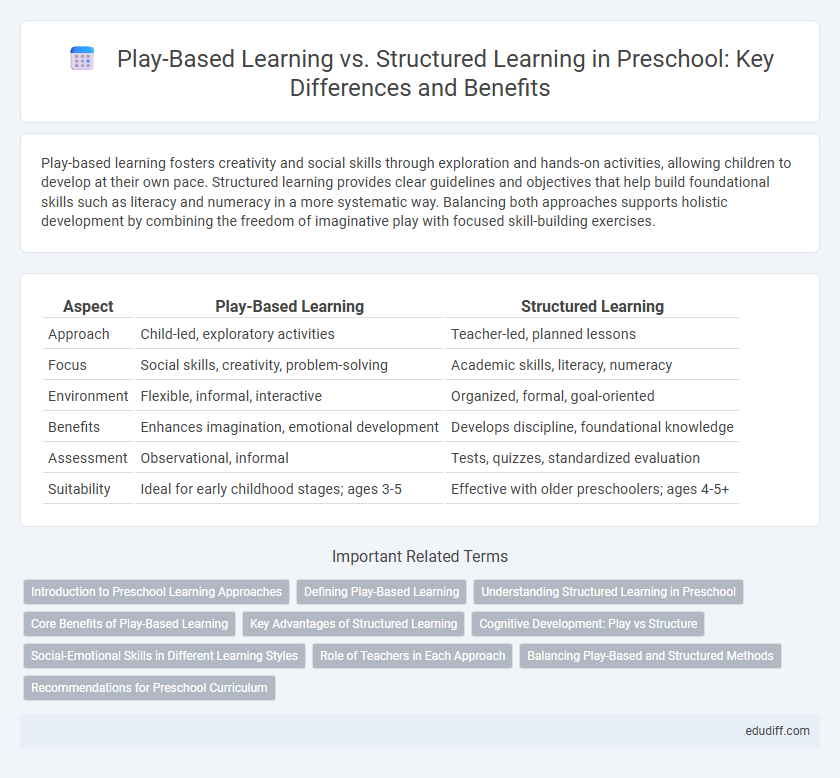Play-based learning fosters creativity and social skills through exploration and hands-on activities, allowing children to develop at their own pace. Structured learning provides clear guidelines and objectives that help build foundational skills such as literacy and numeracy in a more systematic way. Balancing both approaches supports holistic development by combining the freedom of imaginative play with focused skill-building exercises.
Table of Comparison
| Aspect | Play-Based Learning | Structured Learning |
|---|---|---|
| Approach | Child-led, exploratory activities | Teacher-led, planned lessons |
| Focus | Social skills, creativity, problem-solving | Academic skills, literacy, numeracy |
| Environment | Flexible, informal, interactive | Organized, formal, goal-oriented |
| Benefits | Enhances imagination, emotional development | Develops discipline, foundational knowledge |
| Assessment | Observational, informal | Tests, quizzes, standardized evaluation |
| Suitability | Ideal for early childhood stages; ages 3-5 | Effective with older preschoolers; ages 4-5+ |
Introduction to Preschool Learning Approaches
Play-based learning in preschool encourages creativity and social skills through child-led activities that foster exploration and imagination. Structured learning involves teacher-directed tasks aimed at developing specific academic skills such as literacy and numeracy. Both approaches contribute to early childhood development by balancing cognitive growth and emotional well-being.
Defining Play-Based Learning
Play-based learning centers on engaging children through hands-on activities that promote creativity, problem-solving, and social interaction. This approach harnesses natural curiosity, encouraging exploration in a flexible environment without rigid instructions. Emphasizing child-led experiences, play-based learning supports cognitive, emotional, and physical development by allowing children to learn through meaningful play.
Understanding Structured Learning in Preschool
Structured learning in preschool emphasizes a carefully planned curriculum with specific goals and teacher-led activities designed to develop foundational skills in literacy, numeracy, and social behavior. This approach supports cognitive development by providing consistent routines and clear expectations, facilitating measurable progress in early childhood education. Research indicates that structured learning environments can enhance children's ability to focus, follow instructions, and build essential academic competencies before entering formal schooling.
Core Benefits of Play-Based Learning
Play-based learning in preschool fosters creativity, social skills, and problem-solving abilities by allowing children to explore and interact with their environment naturally. It supports emotional development and intrinsic motivation through hands-on activities that adapt to each child's interests and developmental pace. This approach enhances cognitive growth more effectively than structured learning by encouraging imagination and critical thinking in real-world contexts.
Key Advantages of Structured Learning
Structured learning in preschool enhances cognitive development through organized activities that promote critical thinking and problem-solving skills. It ensures consistent skill acquisition, preparing children for academic expectations with measurable progress in literacy and numeracy. This approach establishes routines that foster discipline and time management, supporting long-term educational success.
Cognitive Development: Play vs Structure
Play-based learning enhances cognitive development by fostering creativity, problem-solving, and social interaction through hands-on exploration. Structured learning emphasizes memory retention, sequencing, and rule-following by offering organized activities and clear objectives. Combining both approaches creates a balanced environment that supports critical thinking and executive function skills in preschool children.
Social-Emotional Skills in Different Learning Styles
Play-based learning fosters social-emotional skills by encouraging collaboration, empathy, and communication through imaginative and interactive activities. Structured learning supports these skills by providing clear expectations and guided interactions, helping children develop self-regulation and cooperative behavior within a predictable environment. Combining both approaches enhances social-emotional development by balancing creativity with discipline and social understanding in preschool settings.
Role of Teachers in Each Approach
Teachers in play-based learning facilitate exploration and creativity by guiding children through open-ended activities that promote social, emotional, and cognitive development. In structured learning, educators deliver carefully planned lessons with specific goals, using direct instruction and assessments to track progress and ensure mastery of foundational skills. Both approaches require teachers to adapt their methods to support individual children's needs and foster a positive learning environment.
Balancing Play-Based and Structured Methods
Balancing play-based and structured learning methods in preschool enhances cognitive, social, and emotional development by combining child-led exploration with intentional skill-building activities. Research shows that integrating guided play within a flexible routine supports creativity while promoting foundational literacy and numeracy skills. Effective preschool programs tailor their approach to individual needs, ensuring a dynamic learning environment that fosters both independence and academic readiness.
Recommendations for Preschool Curriculum
Play-based learning fosters creativity, social skills, and cognitive development through hands-on exploration, making it ideal for early childhood education. Structured learning emphasizes foundational skills like literacy and numeracy using systematic lesson plans to ensure academic readiness. A balanced preschool curriculum integrates play-based and structured activities to support holistic development and prepare children effectively for primary school.
Play-based learning vs Structured learning Infographic

 edudiff.com
edudiff.com